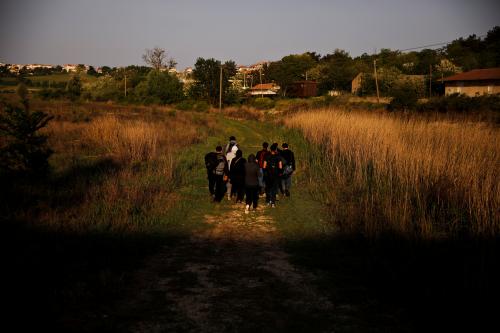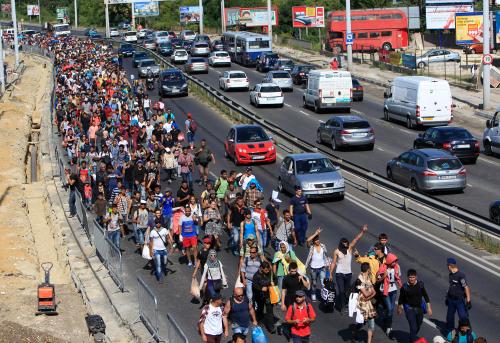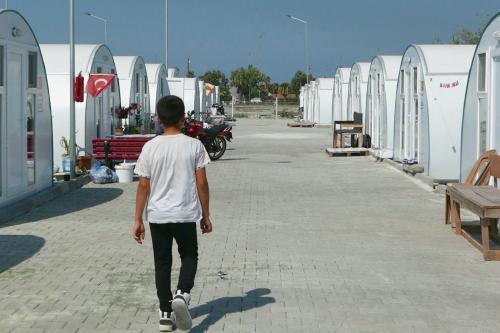At the end of this year, world leaders will gather for the first Global Refugee Forum, a platform established by the newly-adopted Global Compact where states and other stakeholders are expected make pledges towards improving the plight of the world’s 25 million refugees. Among these leaders, there is a growing recognition that the system in place for responding to displacement is no longer fit for purpose. That’s because it is too narrowly focused on meeting the short-term, emergency needs of camp-based populations in low-income countries. What’s needed is a system that is also capable of addressing the long-term social service needs of urban refugees in middle- and high-income countries. Accomplishing that shift will require engaging new actors, chief among them local authorities and the business community.
Local authorities are essential because they are in many cases responsible for designing, delivering, and financing these services. That is particularly the case when it comes to health, housing, and education. Working in partnership with local authorities can enable humanitarians to work through existing delivery systems while avoiding the sorts of duplication that are both costly and unsustainable. It can also enable them to develop context-specific targeting mechanisms that achieve greater scale and reach when delivered through preexisting service delivery channels.
The business community, often nestled within cities, has an equally important role to play in in providing solutions for refugees and the communities that host them. A great deal of important work has been done to lay out how the private sector can engage refugees as employees, and refugee-owned businesses as elements of their global supply chains. This is a crucial component of increasing access to sustainable livelihoods for the majority of refugees worldwide who live in urban environments. It is also worth exploring whether the business community can do more to deliver essential services to urban refugees, in particular by leveraging their core business attributes, in partnership with local authorities and humanitarian actors.
In Sweden, WelcomeTalent has used its platform to connect asylum seekers with job opportunities. In California, the City of San Francisco works with a set of banks and credit unions to increase access to financial services for individuals with no or poor credit history through a program known as Bank on San Francisco. The Tent Foundation has made an effort to lift up relevant examples, but little analytical work has been done to map out domains of opportunity.
There is a real need for such a mapping. Not all sectors are ripe for private-sector engagement. As a report released by the Tent Foundation and the Center on Global Development last year highlights, certain functions are best performed by municipal governments. Those include the provision of public utilities, such as water and electricity. In sectors that are heavily regulated, such as health and education, global business will find it difficult to step in. At a more fundamental level, policymakers should bear in mind that basic service delivery is a component of the social contract between a government and its citizens. It is important that private sector interventions not inadvertently undermine public trust in government institutions, particularly in post-conflict environments, and that they conform to humanitarian and human rights principles.
But some sectors do appear to lend themselves to engagement of this kind. Those where private companies are the primary provider of services to the general population seem most promising. The banking and telecommunications industries, for example, could make good candidates. Turkcell, a major mobile phone company in Turkey—home to the world’s largest refugee population—provides an illustrative example. As large numbers of Syrians began to arrive, the company expanded its infrastructure in the border region, including by building new cell towers there. It also began to provide service in Arabic, at its retail locations, and through an Arabic language call center. Those investments resulted in thousands of new users.
More work should be done to map the space for engagement, paying special attention to associated risks. The results of that mapping could be a component of discussions taking place around the rollout of the new Global Compact for Refugees, now underway. In particular, it might usefully link to the Global Refugee Forum, which aims to be a mechanism for eliciting concrete pledges from stakeholders beyond national governments, including the private sector. The first forum is expected to take place at the end of this year. In the interim, this work should begin. Doing so stands to benefit the nearly two-thirds of the world’s refugees who reside in urban environments, and the communities that are grappling with the challenge of providing services that meet their needs.







Commentary
Beyond camps: With more refugees living in cities, how can local and business leaders engage?
February 15, 2019